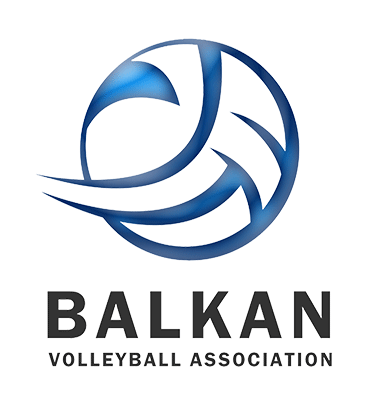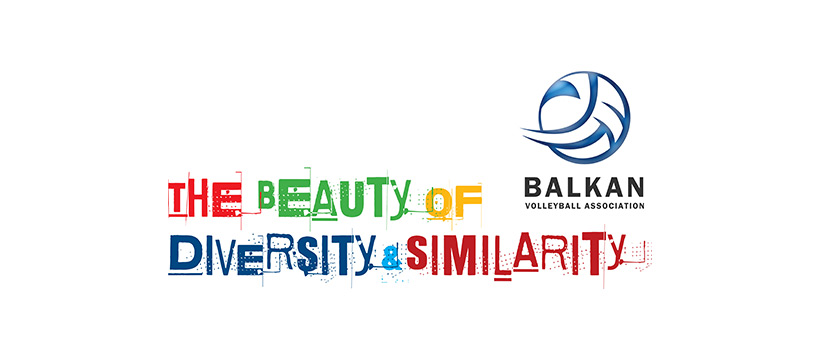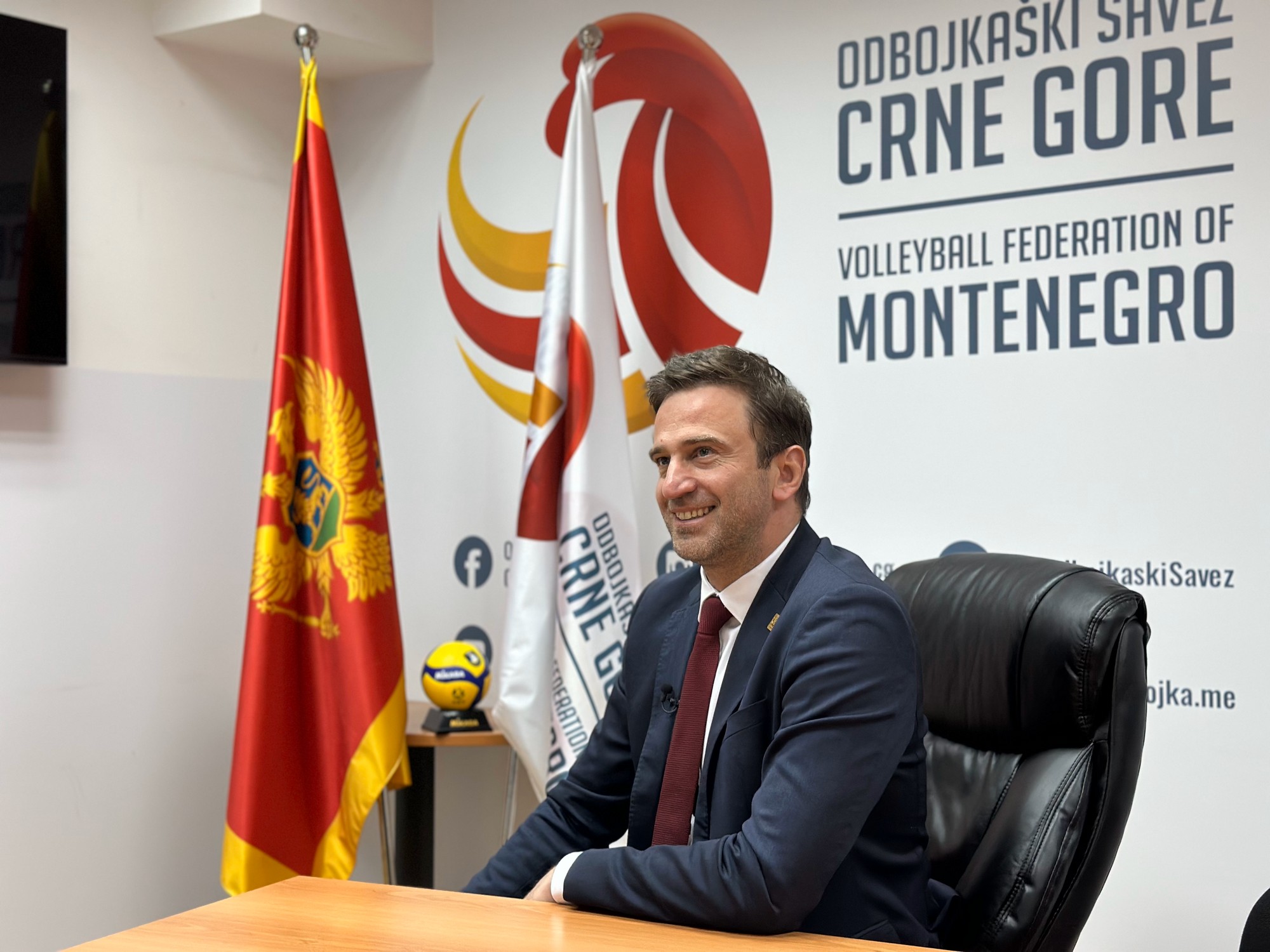Earlier this week, CEV President Roko Sikirić visited Montenegro where he attended the final matches of the Balkan country’s National Cup contested in Budva before moving to Podgorica for a series of high-profile meetings with Deputy Prime Minister Aleksa Bečić and Minister of Sports, Dragoslav Šćekić.
“It was a very emotional experience to watch the finals from the stands since I played several times in that same arena with the Mladost team, so I am well acquainted with the atmosphere in Budva, which again impressed me. I would like to congratulate all the participants, especially the winners; it was a pleasure to attend and show respect for the work of the Volleyball Federation of Montenegro. I would also like to point out that representatives of the Government were present at both matches, which is a big deal for Volleyball, and it was an honour for me to be present as well and raise the profile of this event,” the CEV President said.
Montenegro is a small country, with a small population, yet at the same time it has great potential. “I am the president of 56 National Federations all placed under the umbrella of the European Volleyball Confederation. Obviously, there are large, medium, and small federations. I would classify Montenegro as a medium federation. Montenegro is one of the youngest members of our organisation, with a very impressive portfolio in the delivery of international championships. We are now embarking on a complete revamping of European national team competitions, starting with the younger age categories. The European Volleyball Commission, which also includes a representative from Montenegro, Mr Ivan Bošković, is working on new format projects that will provide better competition conditions for medium and smaller federations. Furthermore, we are focusing on the development of senior competitions. Montenegro will be playing in the Golden League for the first time, which clearly shows their growth and progress, and at the same time, the team is involved in the EuroVolley qualifiers. It is very challenging for federations like the OSCG to keep up, as large budgets are allocated for these two competitions. That is why our new administration has decided to restructure these competitions in a way that, instead of two tournaments being played like this coming summer, there will be just one in the future,” the CEV President added.
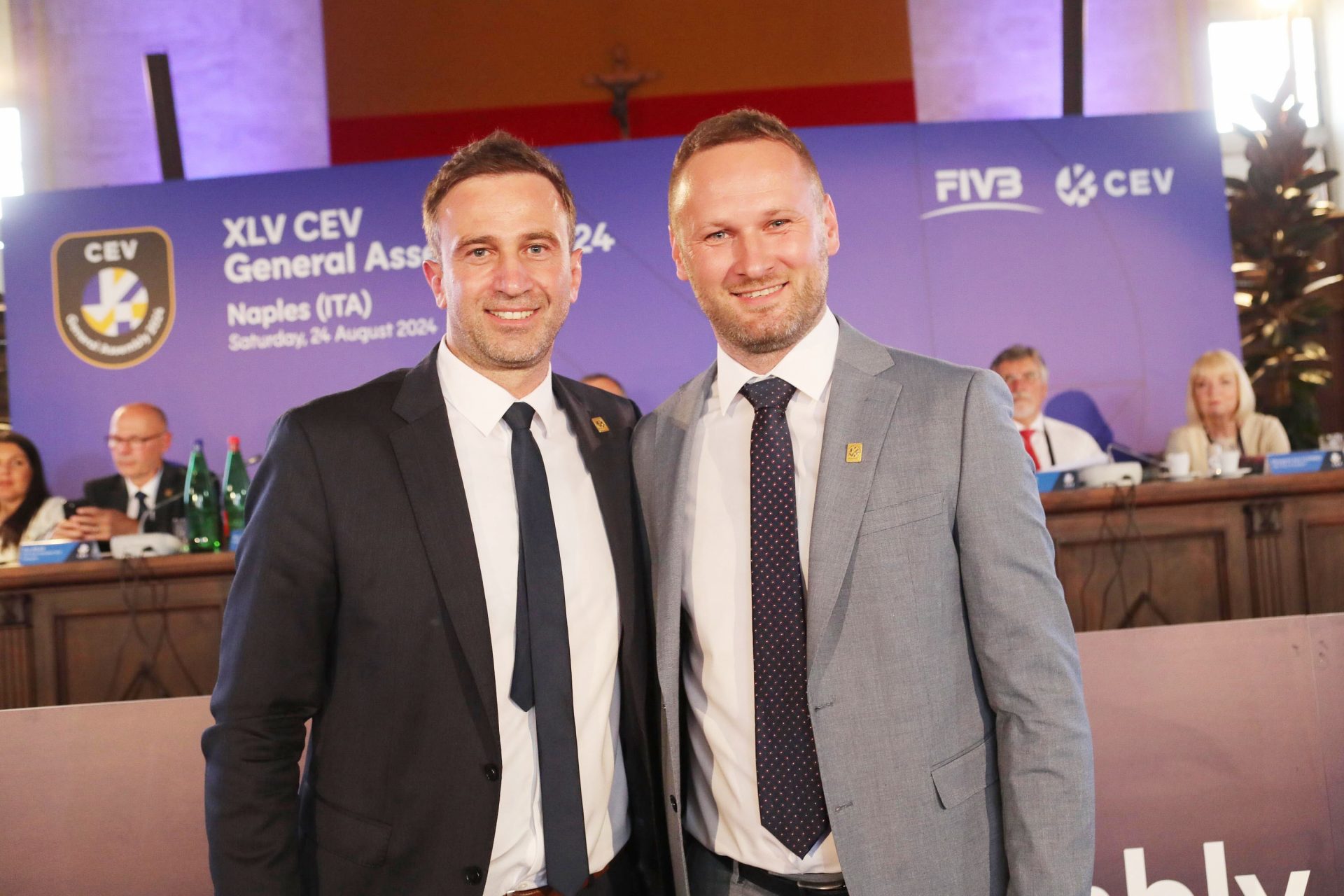
The CEV President together with OSCG President Nikola Kažić at last year’s CEV General Assembly in Naples, Italy
Previously, things were different, and smaller and medium-sized National Federations were quite frustrated. “I have visited 20 National Federations since taking office because the only way to change and improve something is to listen to the other side, not only the Federations but also the clubs. We are on the ground, talking, understanding the issues, and the federations were indeed frustrated – nothing had changed for years, smaller Federations were neglected, and the focus was on the interests of the larger ones. This is why we are now in a situation where you must play in two competitions this summer, both in the men’s and women’s categories, with enormous expenses. That is why we have initiated changes. I have had several important conversations with OSCG President Nikola Kažić, I know what his strategy is, and the OSCG will have full support from CEV. We will provide all the tools needed to successfully implement their projects.”
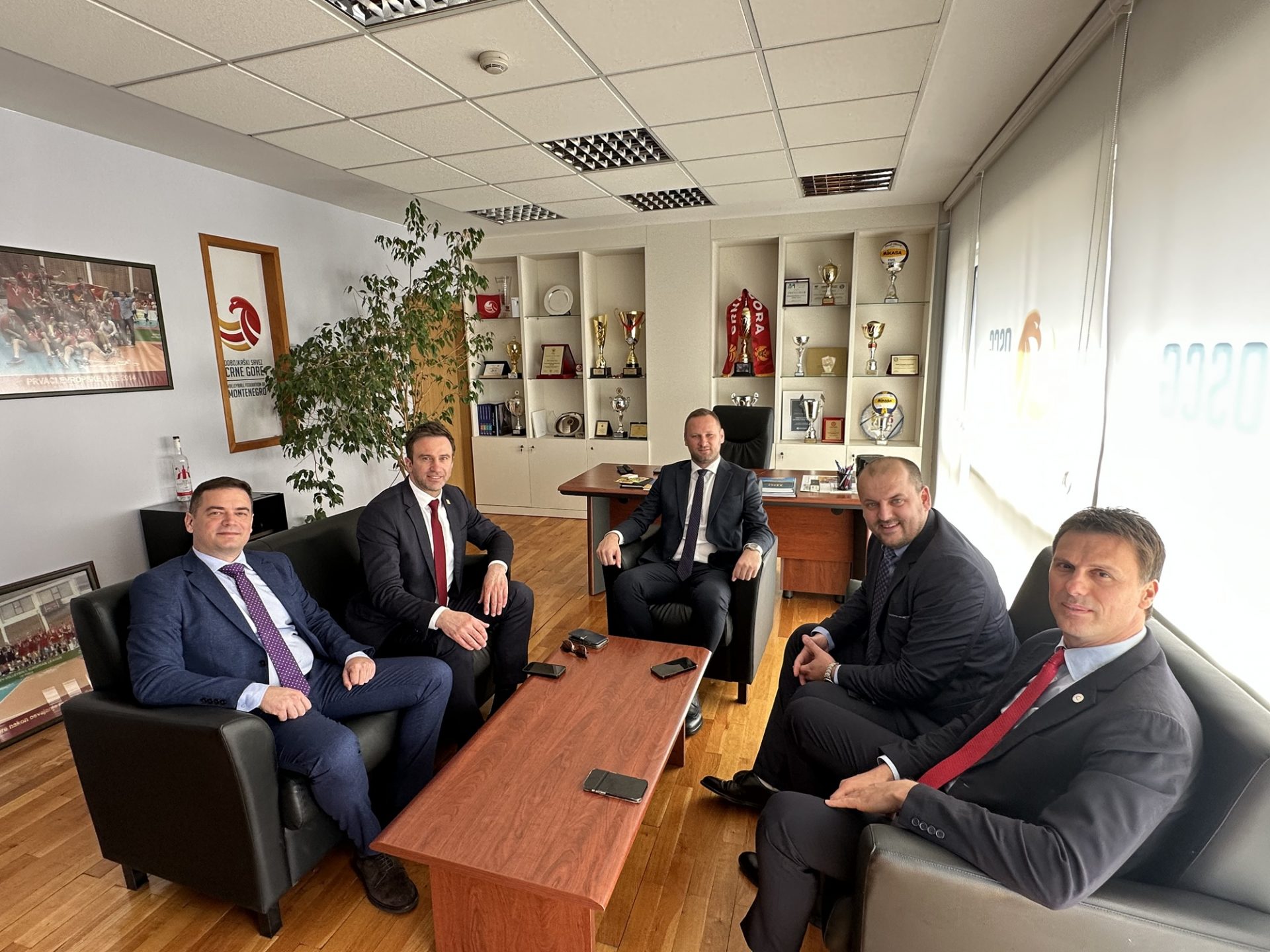
The CEV President with colleagues from Montenegro, Croatia and Serbia during his visit to Podgorica
Montenegrin clubs, both men’s and women’s, will participate in the regional MEVZA League from the next season. “Participation of Montenegrin clubs in the MEVZA League is an excellent platform for young players and clubs to showcase themselves in the European Volleyball scene and achieve the growth that all young players at their age should experience. During my conversation with the OSCG President, he emphasised the importance of Montenegrin clubs participating in the MEVZA League, and it was my responsibility to enable that. As a former player and sports director, watching the Cup final matches, I saw great potential. With the good work the OSCG has been doing, and the strategy we have implemented and continue to implement together, a great future lies ahead for Volleyball in Montenegro. It is crucial to have support, not only from CEV but also from the Government, as I witnessed during the matches, and I wholeheartedly thank them for showing their love for the sport,” the CEV President added.
One of the projects the CEV has been working on is the Solidarity Fund, modelled after FIFA and UEFA, where all Federations will soon be able to apply. “Federations will be able to apply for various infrastructure projects, coach funding projects, and resources such as courts, nets, and balls.”
The leader of European Volleyball highlighted that the Volleyball Federation of Montenegro has, in some areas, been even ahead of CEV. “There is a mini volleyball league, involving 80-90 teams, with over a thousand children participating. We at CEV also have a similar project involving schools, but the OSCG actually started before us. This project not only focuses on expanding the volleyball base but also aims to involve more young people in sports, to help them develop as individuals, and to support children’s health. Volleyball is a global sport, and a major expansion is expected, with Europe leading the way. It is a great responsibility and pleasure for me to continue developing European and world Volleyball.”
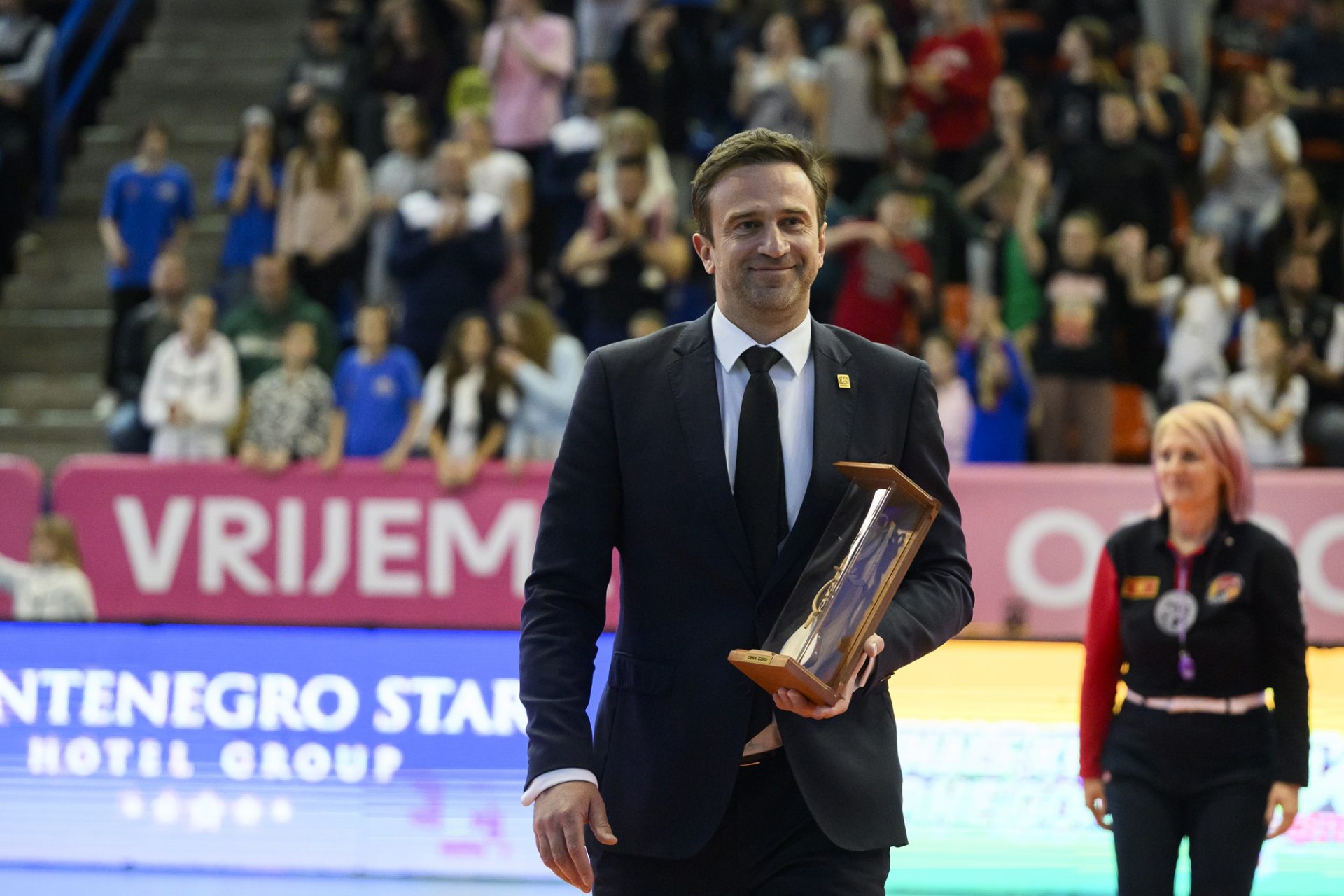
The CEV President attended and awarded the winners of the National Cup Finals of Montenegro held this past Sunday in Budva
Discussing the future of European Volleyball ,he added: “We have been working on securing sponsorship agreements, and we have achieved a major contract that we are yet to announce. The fact is that for years, the Champions League did not have a sponsor. We are working with a company that closely collaborates with UEFA and has managed all their competition formats, from youth categories to senior national and club competitions. They want to cooperate with us, and this will help us a lot. The development of the Champions League is not just about improvements to the competition format – we are taking a holistic approach. Commercial aspects, marketing, digital communications – the complete branding of the product we want to present,” he stressed.
Sikirić represented the Croatian national team 89 times, played for various clubs in different countries, and, alongside his top-level Volleyball career, managed to complete a degree in Global and Sports Management at Boston University. The diploma, as he says, means a lot to him.
“Throughout my career, I tried to balance my studies because I know that an athlete’s career is short, practically from one day to the next – you never know what injury might occur on the court. I must admit that I faced many failures – I changed four faculties before finally managing to set aside time despite club commitments. At the age of 30, I enrolled in my first faculty – sports management, and I continued, completing everything at Boston University. That diploma means a lot to me because it offers me the opportunity to see a broader picture, which I need, besides the volleyball knowledge I gained as a player and later as a sports director.”
His example could serve as an inspiration for young Volleyball players and athletes in general.
“My degree is an investment in myself. No one can take that away from me. Young players often try to become coaches, which I highly respect. My path from player to sports professional, director, and then to working at CEV and eventually reaching one of the leading roles in European sports did not happen overnight – it took a lot of investment and sacrifice. But let this be a sign to the players who played in the Cup final in Budva, to whom it was an honour that I handed them the trophy, that if I made it, they can too. Maybe not in this position – since there’s only one of it – but in various other areas, they should focus on roles that will benefit both themselves and sports in general.”

